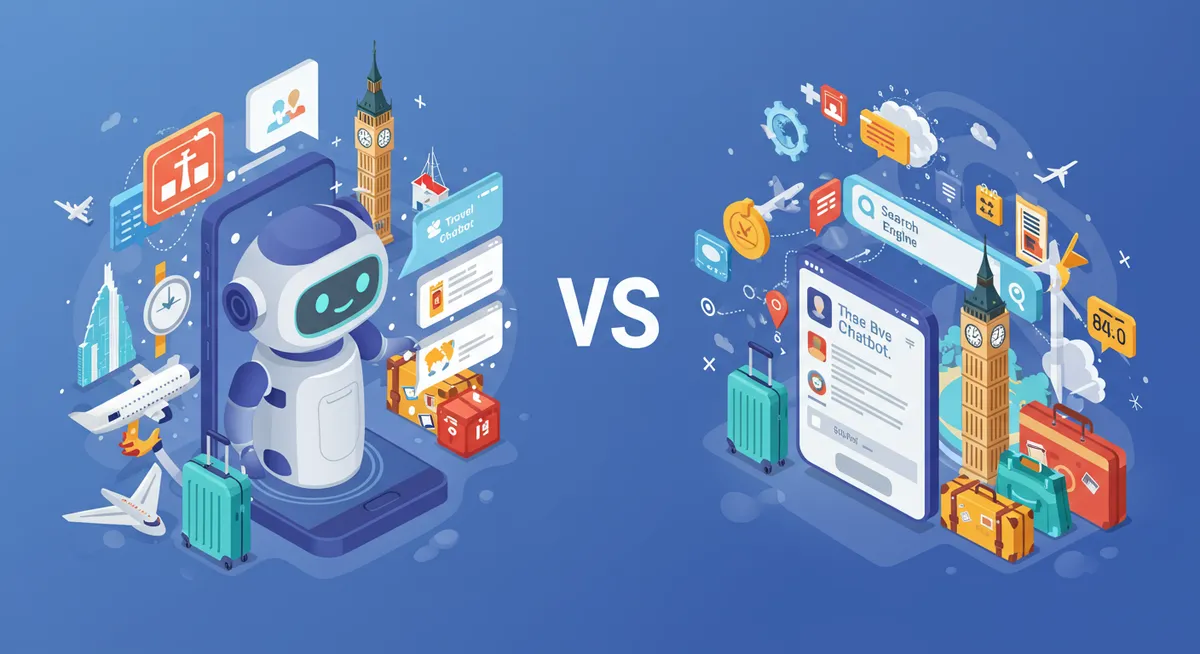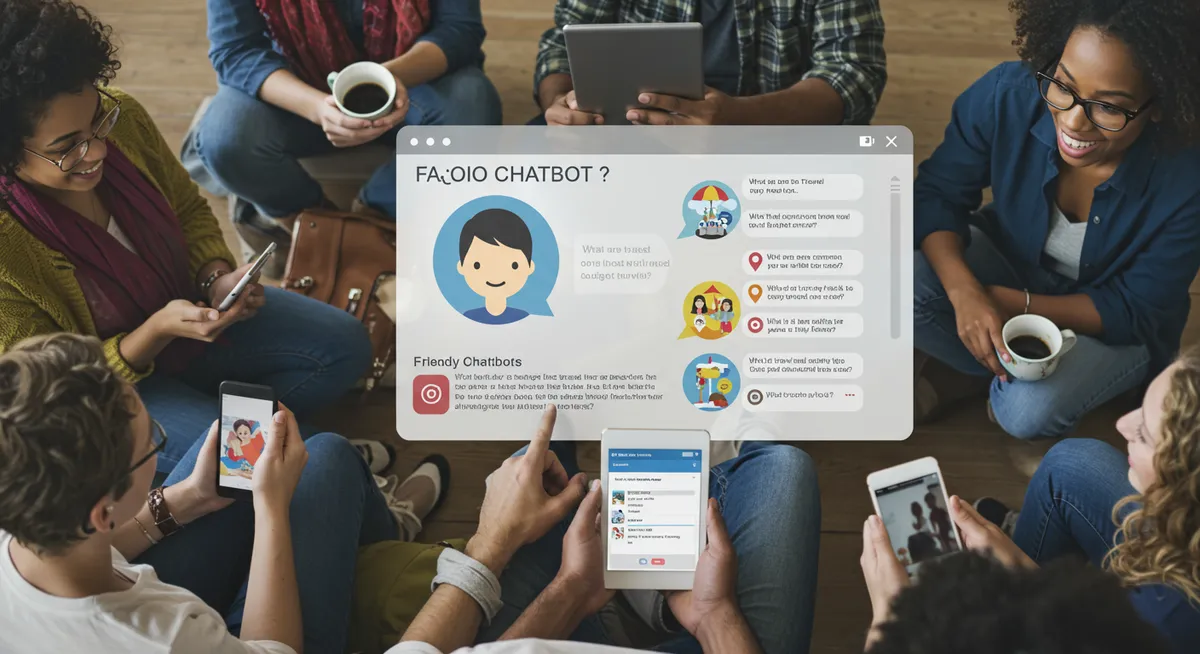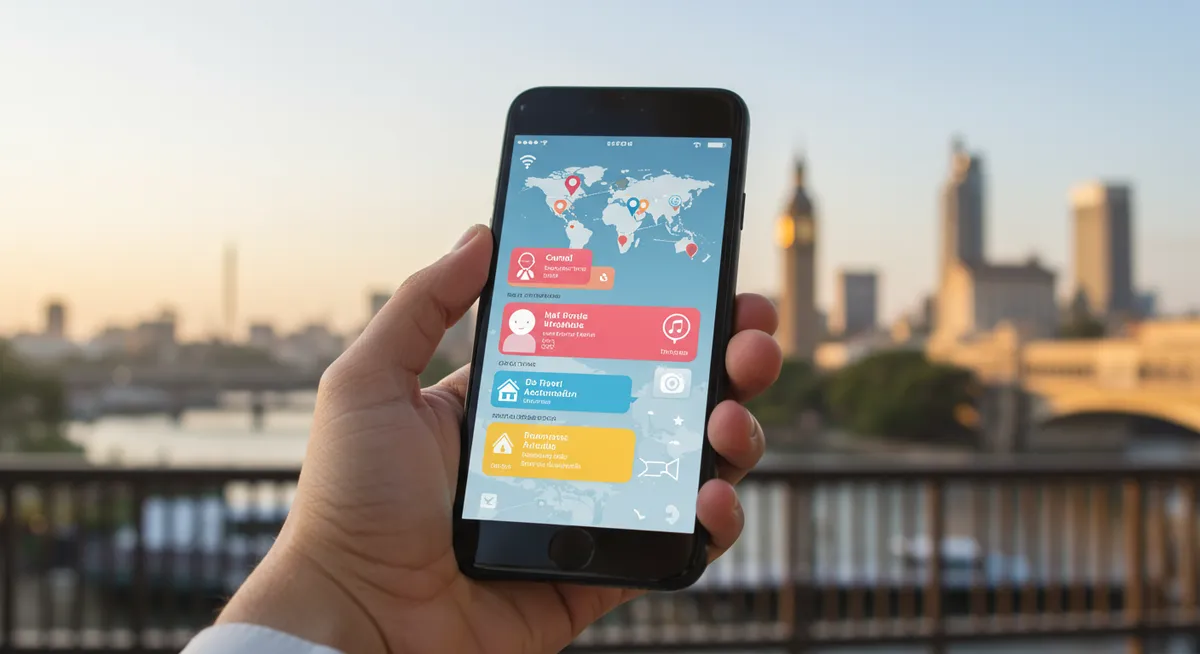Travel Chatbot vs Search Engine Planning: Which is Better for Your Trip?
The way we plan travel has evolved dramatically with the introduction of AI-powered travel chatbots. While search engines have been the traditional go-to for travel research, modern travelers now have a choice between conversational AI assistants and traditional search-based planning. This comprehensive comparison explores the strengths and limitations of each approach, helping you understand when to use travel chatbots versus search engines for the most effective trip planning experience.
Key Takeaways
Plan this trip faster with our free online itinerary maker. Get a personalized day-by-day plan in minutes.
- Travel chatbots provide personalized, conversational planning while search engines offer broad information gathering
- Chatbots excel at real-time data and instant recommendations, search engines are better for comprehensive research
- AI assistants offer 24/7 availability and context-aware responses
- Search engines provide access to diverse sources and user-generated content
- The optimal approach often combines both: chatbots for planning, search engines for validation
The Evolution of Travel Planning Methods
Travel planning has undergone a significant transformation over the past decade. Traditional methods relied heavily on guidebooks, travel agents, and word-of-mouth recommendations. The internet introduced search engines as the primary tool for travel research, allowing travelers to access vast amounts of information instantly. Now, AI-powered travel chatbots represent the next evolution, offering conversational, personalized planning experiences.
According to recent research from the Travel Technology Association, 73% of travelers use search engines for initial destination research, while 58% now also use AI travel assistants for specific planning tasks. This dual approach reflects the complementary nature of these tools and their different strengths in the travel planning process.
Traditional Search Engine Planning
Search engines have been the cornerstone of digital travel planning for over two decades, offering:
- Comprehensive Information Access: Access to millions of travel websites, blogs, and resources
- User-Generated Content: Reviews, photos, and experiences from real travelers
- Diverse Perspectives: Multiple viewpoints and travel styles
- Historical Data: Access to archived information and past experiences
- Visual Content: Photos, videos, and virtual tours from various sources
Modern AI Travel Chatbots
AI travel chatbots represent the cutting edge of travel technology, providing:
- Conversational Interface: Natural language interaction for travel planning
- Personalized Recommendations: AI-powered suggestions based on your preferences
- Real-Time Data Integration: Live updates on prices, availability, and conditions
- Context Awareness: Understanding of your travel history and preferences
- Proactive Assistance: Anticipating needs and offering relevant suggestions
Detailed Comparison: Travel Chatbots vs Search Engines
Let's examine the key aspects where travel chatbots and search engines differ, helping you understand which tool is better suited for different planning tasks.
Information Gathering and Research
Search Engines:
- Broad Scope: Access to virtually unlimited travel information
- Multiple Sources: Diverse perspectives from various websites and platforms
- User Reviews: Real traveler experiences and recommendations
- Visual Content: Extensive photo and video galleries
- Historical Data: Access to past travel experiences and trends
Travel Chatbots:
- Curated Information: Pre-screened, high-quality travel data
- Structured Responses: Organized information in digestible formats
- Real-Time Updates: Current information on prices, availability, and conditions
- Personalized Filtering: Information tailored to your specific needs
- Verified Sources: Information from trusted travel databases
Planning Efficiency and Speed
Search Engines:
- Manual Research: Requires time to sift through multiple sources
- Information Overload: Can be overwhelming with too many options
- Time-Consuming: Hours spent reading reviews and comparing options
- Decision Paralysis: Too many choices can lead to indecision
- Inconsistent Information: Conflicting advice from different sources
Travel Chatbots:
- Instant Responses: Immediate answers to specific questions
- Streamlined Process: Guided planning with clear next steps
- Quick Comparisons: Rapid analysis of multiple options
- Decision Support: AI-powered recommendations to reduce choice overload
- Consistent Information: Unified data from reliable sources
Personalization and Customization
Search Engines:
- Generic Results: Same information for all users
- Manual Filtering: Users must apply their own preferences
- No Memory: Doesn't remember previous searches or preferences
- Broad Recommendations: General advice that may not fit your style
- Static Results: Information doesn't adapt to your needs
Travel Chatbots:
- Learning Capabilities: Remembers your preferences and travel history
- Adaptive Responses: Tailors recommendations based on your profile
- Context Awareness: Understands your current planning stage
- Dynamic Suggestions: Recommendations evolve based on your feedback
- Personalized Experience: Customized planning journey for each user
Real-Time Information and Updates
Search Engines:
- Static Content: Information may be outdated or inaccurate
- No Live Updates: Cannot provide real-time price or availability data
- Historical Focus: Often shows past experiences rather than current conditions
- Manual Verification: Users must check current information themselves
- Delayed Updates: Website content may not reflect recent changes
Travel Chatbots:
- Live Data Integration: Real-time prices, availability, and conditions
- Instant Updates: Immediate notification of changes
- Current Information: Always up-to-date travel data
- Proactive Alerts: Notifications about relevant changes
- Dynamic Pricing: Real-time cost comparisons and deals
When to Use Search Engines for Travel Planning
💡 Pro Tip: Book your Travel Technology adventures in advance through Viator for the best deals!
Search engines excel in specific scenarios where comprehensive research and diverse perspectives are needed:
Initial Destination Research
Search engines are ideal for the early stages of travel planning:
- Destination Discovery: Exploring new places and getting inspired
- Broad Overview: Understanding the general character of a destination
- Visual Research: Looking at photos and videos of potential destinations
- Cultural Understanding: Learning about local customs, history, and culture
- Travel Inspiration: Finding new ideas and destinations to consider
Detailed Research and Validation
Search engines shine when you need to dive deep into specific topics:
Example: "I want to research the best hiking trails in the Swiss Alps, read detailed reviews from experienced hikers, see photos from different seasons, and understand the difficulty levels and safety considerations."
User-Generated Content and Reviews
Search engines provide access to authentic traveler experiences:
- Trip Reports: Detailed accounts of recent trips
- Photo Galleries: Real traveler photos and experiences
- Forum Discussions: Community advice and recommendations
- Blog Posts: Personal travel stories and insights
- Social Media Content: Current experiences and trends
Niche and Specialized Information
Search engines are better for finding specialized travel information:
- Specific Activities: Detailed information about particular hobbies or interests
- Local Expertise: Information from residents and local experts
- Historical Context: Deep dives into destination history and culture
- Technical Details: Specific requirements for activities like diving, climbing, etc.
- Alternative Perspectives: Information from sources outside mainstream travel
When to Use Travel Chatbots for Planning
Travel chatbots excel in scenarios requiring personalized assistance, real-time data, and efficient planning:
Specific Planning Tasks
Chatbots are ideal for concrete planning activities:
- Itinerary Creation: Building day-by-day travel schedules
- Booking Assistance: Finding and comparing flights, hotels, and activities
- Budget Planning: Cost estimation and optimization
- Route Optimization: Planning efficient travel routes and transportation
- Real-Time Booking: Instant reservations and confirmations
Personalized Recommendations
Chatbots provide tailored suggestions based on your preferences:
Example: "I'm a vegetarian who loves art museums and prefers boutique hotels. I'm traveling with my partner for our anniversary and have a budget of $3,000 for a week in Europe."
Time-Sensitive Planning
Chatbots are invaluable when you need quick answers:
- Last-Minute Planning: Quick decisions for spontaneous trips
- Emergency Situations: Handling changes, cancellations, or problems
- Real-Time Updates: Getting current information about conditions
- Quick Comparisons: Rapid analysis of multiple options
- Instant Bookings: Immediate reservations when availability is limited
Ongoing Travel Support
Chatbots provide continuous assistance during your trip:
- 24/7 Availability: Help whenever you need it, regardless of time zone
- Local Recommendations: Real-time suggestions based on your location
- Problem Solving: Immediate assistance with travel issues
- Weather Updates: Current conditions affecting your plans
- Transportation Assistance: Real-time transit information and alternatives
Cost and Time Comparison
Understanding the financial and time investment required for each approach helps you make informed decisions:
Search Engine Planning Costs
| Aspect | Cost | Time Investment |
|---|---|---|
| Information Gathering | Free | 5-20 hours |
| Price Comparison | Free | 2-5 hours |
| Booking Research | Free | 3-8 hours |
| Itinerary Planning | Free | 4-12 hours |
| Ongoing Updates | Free | 1-3 hours daily |
Travel Chatbot Planning Costs
| Aspect | Cost | Time Investment |
|---|---|---|
| Basic Planning | Free | 30 minutes - 2 hours |
| Price Comparison | Free | 5-15 minutes |
| Booking Assistance | Free | 10-30 minutes |
| Itinerary Creation | Free | 15-45 minutes |
| Ongoing Support | Free | 5-15 minutes as needed |
The Hybrid Approach: Best of Both Worlds
Many experienced travelers have discovered that the optimal approach combines both search engines and travel chatbots:
Phase 1: Search Engine Research
Start with search engines for broad exploration:
- Destination Discovery: Use search engines to explore potential destinations
- Visual Research: Look at photos and videos to get inspired
- Cultural Understanding: Read about local customs and history
- User Reviews: Check authentic traveler experiences
- Niche Information: Research specific activities or interests
Phase 2: Chatbot Planning
Then use chatbots for specific planning tasks:
- Itinerary Creation: Build detailed day-by-day schedules
- Booking Optimization: Find the best deals and availability
- Real-Time Updates: Get current information and prices
- Personalized Recommendations: Get suggestions tailored to your preferences
- Quick Decisions: Make fast choices when time is limited
Phase 3: Validation and Refinement
Use search engines to validate chatbot recommendations:
- Cross-Reference Information: Verify chatbot suggestions with multiple sources
- Read Recent Reviews: Check current traveler experiences
- Look for Alternatives: Find additional options the chatbot might have missed
- Cultural Context: Understand the broader context of recommendations
- Local Insights: Get perspectives from residents and local experts
Real-World Scenarios: Which Tool Wins?
Let's examine specific travel scenarios to see which approach provides the best value:
Scenario 1: Planning a Family Vacation to Japan
Requirements: 2-week family trip, kid-friendly activities, cultural experiences
Winner: Hybrid Approach
Why: Use search engines for cultural research and family travel blogs, then use chatbots for itinerary creation and booking optimization
Scenario 2: Last-Minute Business Trip
Requirements: 3-day business trip, hotel near conference center, quick booking
Winner: Travel Chatbot
Why: Speed and efficiency are crucial, chatbot can handle booking and logistics quickly
Scenario 3: Adventure Travel Planning
Requirements: Multi-day hiking trip, specialized equipment, safety considerations
Winner: Search Engines
Why: Need detailed technical information, safety advice, and recent trail conditions from experienced hikers
Scenario 4: Luxury Honeymoon Planning
Requirements: Premium accommodations, exclusive experiences, romantic atmosphere
Winner: Hybrid Approach
Why: Use search engines for inspiration and reviews, then use chatbots for booking and coordination
Future Trends: The Evolving Landscape
⭐ Recommendation: Don't miss out on amazing Travel Technology tours - book now!
The travel planning landscape continues to evolve, with both search engines and chatbots adapting to changing user needs:
AI-Enhanced Search
Search engines are incorporating AI features:
- Personalized Results: Search results tailored to user preferences
- Voice Search: Natural language search capabilities
- Visual Search: Image-based travel discovery
- Predictive Search: Anticipating user needs and interests
- Contextual Results: Search results based on location and timing
Advanced Chatbot Capabilities
Travel chatbots are becoming more sophisticated:
- Multi-Modal Interaction: Voice, text, and image-based communication
- Predictive Planning: Anticipating needs before users ask
- Emotional Intelligence: Understanding user emotions and preferences
- Seamless Integration: Connecting with other travel services and apps
- Augmented Reality: Visual planning and destination exploration
FAQ: Travel Chatbots vs Search Engines
Are travel chatbots more accurate than search engine results?
Travel chatbots and search engines serve different purposes in terms of accuracy. Chatbots excel at providing current, structured information from verified sources, while search engines offer access to diverse perspectives and user-generated content. Chatbots are more accurate for real-time data like prices and availability, while search engines are better for comprehensive research and authentic traveler experiences.
Can I trust travel chatbot recommendations over search engine results?
Travel chatbot recommendations are generally reliable for booking and logistics, as they use verified data sources. However, for subjective matters like personal preferences and authentic experiences, search engine results from real travelers often provide more trustworthy insights. The best approach is to use chatbots for factual information and search engines for personal experiences and reviews.
Which is better for finding the best deals: chatbots or search engines?
Travel chatbots are typically better for finding the best deals because they have access to real-time pricing data and can quickly compare multiple options. They can also monitor prices and alert you to drops. Search engines are better for understanding the overall value and reading detailed reviews about whether a deal is actually worth it.
Do travel chatbots replace the need for search engines entirely?
No, travel chatbots don't replace search engines entirely. They serve complementary purposes: chatbots excel at efficient planning and booking, while search engines are better for comprehensive research, inspiration, and validation. The most effective approach combines both tools, using search engines for initial research and chatbots for specific planning tasks.
Which option is better for first-time travelers?
For first-time travelers, a hybrid approach is best. Start with search engines to understand destinations, read travel guides, and get inspired. Then use travel chatbots for the actual planning and booking process, as they can guide you through the steps and prevent common mistakes. Chatbots are particularly helpful for first-time travelers who may not know what questions to ask.
Conclusion
The choice between travel chatbots and search engines depends on your specific needs, travel style, and the stage of your planning process. Both tools have unique strengths that make them valuable for different aspects of travel planning.
Search engines excel at comprehensive research, destination discovery, and accessing authentic traveler experiences. They're ideal for the early stages of planning when you're exploring options and gathering information.
Travel chatbots shine at efficient planning, real-time data, and personalized recommendations. They're perfect for specific planning tasks, quick decisions, and ongoing travel support.
The most successful travelers use a hybrid approach, leveraging the strengths of both tools. Start with search engines for inspiration and research, then use chatbots for efficient planning and booking. This combination provides the best of both worlds: comprehensive information and streamlined planning.
Ready to experience the power of AI-powered travel planning? Chat now with our AI travel assistant and discover how modern technology can enhance your travel planning experience.
Choose the right planning approach for your travel needs
- Use search engines for initial research and inspiration - Get comprehensive information
- Use chatbots for efficient planning and booking - Save time and get personalized recommendations
- Combine both approaches for optimal results - Best of both worlds



